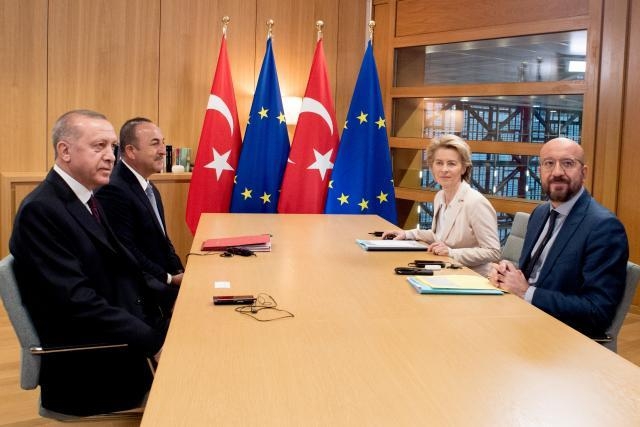The two Nordic countrie’s formal applications on Wednesday to join the 30-members defence alliance has not only angered Russia but also met opposition from Turkey which threatens to derail a process which until now was supposed to be handled rapidly.
As reported already in April, NATO welcomed their membership with open arms. “If they want to, they can join with ease,” said NATO chief Jens Stoltenberg. NATO itself was supposed to approve their applications almost immediately. What would take time was the ratification process by the parliaments in the member countries as the decision has to be taken by unanimity.
In the meantime, Sweden and Finland might be exposed to Russian counter measures but both the US and UK have committed to offer security guarantees to them during this period. Russia seems also to have played down its threats and for now has limited itself to economic counter measures such as interrupting the export of natural gas to Finland.
However, Turkey, a NATO member since 1952 but with tense relation to both the US and the EU in recent years, might derail the process. Ankara is sensitive about the position of other countries on the Kurdish issue and has raised objections.
It demands that Sweden in particular extradites alleged terrorists linked to the Kurdistan Workers´ Party (PKK) and political opponents linked to the Gulenist movement (FETÖ), named after the cleric Fethullah Gulen who lives in exile in the US. According to the Turkish government, the movement was behind the military coup on 15 July 2016.
The failed coup took the lives of 250 civilians and security personnel and left thousands of people injured. The coup plans were discovered in time and foiled but the traumatic event is still hunting Turkish society and causing tension in the relations between EU and Turkey. In fact, in recent years, the EU and Turkey have disagreed on almost everything and the accession process is on hold.
The issues of concern between the EU and Turkey are much more than the extradition of some people from two of its member states. EU – Turkey relations have reached an all-time low in all major issues such as the accession process, visa liberalisation, counter-terrorism, migration, trade and the situation in Syria, in particular the northern part of the country following Turkish invasions in 2018 and 2019.
The most effective domestic fighting force against the Islamic State (IS) in northern Syria was a Syrian- Kurdish militia, the People’s Protection Units (YPG), the armed wing of the leftist Kurdish Democratic Union Party (PYD). Since the outbreak of the Syrian civil war, the Kurdish-led Autonomous Administration in north-east Syria has established a functioning local self-government in the region.
While PKK is still on the EU’s list of terrorist organisations, YPG is not. The EU has condemned Turkey’s military action in north-east Syria. Turkey’s position is that YPG is a terrorist group linked to PKK, against which it has been fighting since 1984. A cease-fire during which Turkey and PKK entered peace negotiations ended in July 2015 when Turkey resumed bombing PKK bases in Iraq.
Some of the people Turkey wants extradited are Swedish citizens. The Turkish ambassador to Sweden claimed in an interview in Swedish daily Dagens Nyheter that Sweden is acting against Turkey by supporting terrorist organisations. He even wanted a member of the Swedish parliament extradited although she was not on the Turkish list.
The Swedish foreign minister has rejected the Turkish demands as disinformation. On Friday, she tweeted:
“Due to the vastly spread disinformation about Sweden and PKK, we would like to recall that the Swedish Government of Olof Palme was first after Turkey to list PKK as a terrorist organization, already in 1984. EU followed suit 2002, when Anna Lindh was Swedish foreign minister. This position remains unchanged.”
Asked by The Brussels Times about Turkey’s opposition against Sweden and Finland joining NATO, Cengiz Aktar, a Turkish professor in political science at National and Kapodistrian University of Athens, replied that it should not be taken very seriously.
“Turkey tries to get something out of it, as always. By pleasing Russia and by trying to bargain with the West, be it the closure of a bank sanctions case in the US, lifting the American arms embargo, or obtaining security guarantees.”
He thinks that at the end of the day no country will yield anything and that Ankara will be under constant pressure by the other NATO members. “What Ankara is asking for from Finland and Sweden is simply put absurd. No country will negotiate away their sovereign right to grant asylum, citizenship and public office.”
Russia invaded Ukraine under several pretexts and one of them was that it wanted to prevent NATO expansion. Its military adventure will have the opposite effect if Sweden and Finland, two countries that historically have been neutral or non-aligned and opposed NATO membership, will join NATO because they are fearing Russian aggression and are not able to defend themselves.
Finland’s model of non-alignment was seen a possible example for Ukraine in negotiations with Russia on a political solution. Sweden has no direct border with Russia and poses no threat to it. Their decision to join NATO does not help Ukraine in its war of defence against Russia and might even prolong the war if peace talks are not resumed.
M. Apelblat
The Brussels Times

